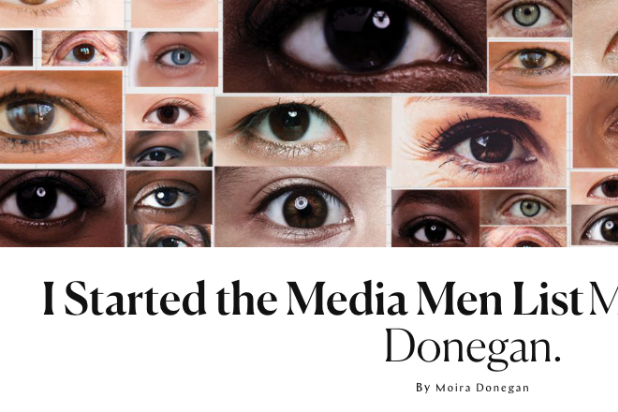By Heidi Stevens
Chicago Tribune
WWR Article Summary (tl;dr) Moira Donegan who outed herself as the person behind the “Shitty Media Men” list says she began the list in an attempt to provide a layer of protection to the women in her industry. She says she was taken aback by how many people, even powerful people, gave it the time of day.
Chicago Tribune
Plot twist.
The creator of the “Shitty Media Men” list identified herself in a piece published on New York Magazine’s blog, The Cut, after days of speculation over whether another magazine was going to out her in March.
Moira Donegan, whose bylines have appeared in the London Review of Books and The New Yorker, writes that she created the Google spreadsheet in October, collecting “a range of rumors and allegations of sexual misconduct, much of it violent, by men in magazines and publishing.”
“The anonymous, crowdsourced document was a first attempt at solving what has seemed like an intractable problem: how women can protect ourselves from sexual harassment and assault,” she writes.
She took the document offline after 12 hours, but it had already gone viral.
“I can’t pretend that the spreadsheet didn’t frighten me,” she writes. “As the stories accumulated and it became clear that many, many more women were using the document than I had ever imagined, I realized that I had created something that had grown rapidly beyond my control. I was overwhelmed and scared. That night, I went to a friend’s house to make dinner, and while I was there I confided in her about my fears. I worried that managing the document would eventually put me in the uncomfortable position of needing to decide whose stories belonged there and whose didn’t. I thought that I would lose my job and the career I’d worked so hard to build. My friend could hear the anxiety in my voice; she urged me to take the document down. But I was conflicted. What was going on there was clearly cathartic for the women who were using it, telling their stories, encouraging one another, saying that it had happened to them too. Many women don’t have the privileges that mitigate the risks of doing such a thing, privileges like whiteness, health, education, and class, and I do; it would be easier for me than for other people.”
Rumors started to swirl that writer Katie Roiphe would be publishing an article naming Donegan in a Harper’s magazine piece slated for March. Twitter exploded with pleas to the magazine to kill the piece.
“Don’t do this, @Harpers,” author Roxane Gay tweeted. “Find your moral compass. This would risk these women’s lives.”
Writer Nicole Cliffe encouraged writers to pull their pending pieces from Harper’s and offered to pay them what they would have made. Throughout the week, she tweeted examples of writers taking her up on the offer and asked editors at other publications to consider running them instead. “I wanted to take the problem of money off the table for them if they were inclined to pull their work from a publication acting in an outrageous manner,” Cliffe told Fast Company.
In Donegan’s piece, she confirms that Roiphe was planning to name her.
“In the weeks after the spreadsheet was exposed, my life changed dramatically. I lost friends: some who thought I had been overzealous, others who thought I had not been zealous enough. I lost my job, too,” Donegan writes. “The fear of being exposed, and of the harassment that will inevitably follow, has dominated my life since. I’ve learned that protecting women is a position that comes with few protections itself.
“This escalated,” she continues, “when I learned Katie Roiphe would be publishing my name in a forthcoming piece in Harper’s magazine. In early December, Roiphe had emailed me to ask if I wanted to comment for a Harper’s story she was writing on the ‘feminist moment.’ She did not say that she knew I had created the spreadsheet. I declined and heard nothing more from Roiphe or Harper’s until I received an email from a fact checker with questions about Roiphe’s piece. ‘Katie identifies you as a woman widely believed to be one of the creators of the S—– Men in Media List,’ the fact checker wrote. “Were you involved in creating the list? If not, how would you respond to this allegation?’ The next day, a controversy ensued on Twitter after Roiphe’s intention to reveal my identity was made public.”
Donegan decided to out herself instead.
“All of this was terrifying,” she writes. “I still don’t know what kind of future awaits me now that I’ve stopped hiding.”
Her essay is an honest, tortured reckoning. She began the list in an attempt to provide a layer of protection to the women in her industry. She was taken aback by how many people, even powerful people, gave it the time of day.
“At the time when I made it, I had become so accustomed to hearing about open secrets, to men whose bad behavior was universally known and perpetually immune from consequence, that it seemed like no one in power cared about the women who were most vulnerable to it,” she writes. “Sexual harassment and assault, even when it was violent, had been tolerated for so long that it seemed like much of the world found it acceptable. I thought that women could create a document with the aim of helping one another in part because I assumed that people with authority didn’t care about what we had to say there. In this sense, at least, I am glad I was wrong.”
The list was born at a time when the country at large is experiencing a similar, tortured reckoning. She was brave to start it, and she’s brave to pen the New York Magazine piece.
Your move, Harper’s.
___
(Contact Heidi Stevens at hstevens@tribune.com, or on Twitter: @heidistevens13.)














































































































































































































































































































































































